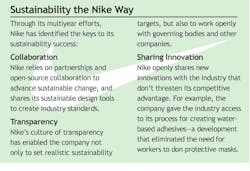To Mark Parker, president and CEO of Nike Inc., sustainability isn't just a buzzword; it's an opportunity to affect meaningful change.
"One of the things I want to leave as a legacy in my role at Nike is to make sure that we're innovating in every aspect of our business, where it really matters, where we use our brand strength and success to create positive change on a larger scale," Parker says in a case study by Harvard Business School.
Parker, who in January 2006 assumed the lead role at the shoe and active wear manufacturer, has spearheaded what has been a comprehensive integration of sustainability into the company's operations.
See Also: Lean Manufacturing Leadership Best Practices
He views sustainability as a route by which the company can not only improve the bottom line, but also use its position as a multinational company to influence change.
"Nike succeeds because we're obsessed with innovation. We are relentlessly curious about our world and how we can make it better. We apply that curiosity to our sustainability efforts, and we continue to learn what is required for real, meaningful progress," Parker says in Nike's most recent sustainability report.
A designer by trade, an artist, Parker treats sustainability as a design challenge.
To that end, Nike last year launched Making -- an app that engineers can use to see the environmental effects of their material choices on water, chemistry, energy and waste and on whether the material uses recycled or organic material -- using data gleaned from its public Materials Sustainability Index.
Nike operates using a Considered Design Index, a set of guidelines against which the company can gauge the environmental impact of each product. The ideal goal -- and that which the Nike executive team propagates -- is to create items without generating any end waste, to create a closed-loop system.
Nike also openly shares new innovations with the industry that don't threaten its competitive advantage. For example, the company gave the industry access to its process for creating water-based adhesives -- a development that eliminated the need for workers to don protective masks.
A Sustainable Business Model
Parker advocates for changing the design not only of the product but also of the process. Thus, he suggests changing the way factories work and how workers are treated to create a new business model.
"Sustainability at Nike means being laser-focused on evolving our business model to deliver profitable growth while leveraging the efficiencies of lean manufacturing, minimizing our environmental impact and using the tools available to us to bring about positive change across our entire supply chain," Parker says. "We've made significant progress in these areas. But as we all know at Nike, there is no finish line."
To create transparency in its supply chain -- and the industry -- Nike in 2010 released an interactive map revealing factory-level data and worker statistics for its 765 factories in 43 countries employing more than 1 million people.
In two years, Nike was able to decrease the percentage of contract factories it used that had unknown conditions from 48% to 8%.
And in three years the company reduced the CO2 emissions from its contract footwear facilities producing the Nike brand by 6%, even as production ramped up 20%.
"Sustainability is not merely an addendum to our core operation. Sustainability will be at the nexus of transformations in business, economies and markets, and we will continue to evolve our business to ensure we are able to grow profitably, and to lead," Parker says.
About the Author
Ginger Christ
Ginger Christ, Associate Editor
Ginger Christ is a former associate editor for EHS Today, a Penton publication.
She has covered business news for the past seven years, working at daily and weekly newspapers and magazines in Ohio, including the Dayton Business Journal and Crain's Cleveland Business.
Most recently, she covered transportation and leadership for IndustryWeek, a sister publication to EHS Today.
She holds a bachelor of arts in English and in Film Studies from the University of Pittsburgh.


